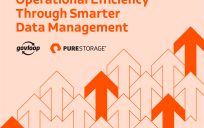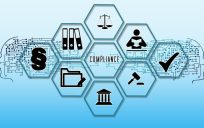This blog post is an excerpt from GovLoop’s research brief, “The New Way to Manage Government Data.”
Government data is a critical resource that can have a positive impact on democracy, civic participation, citizen services, innovation and government efficiency. The ability to not only access but also manage data is vital to government’s mission. Federal agencies are even required by law to properly manage their data as mandated by the 2001 Information Quality Act. The act directs OMB to provide guidelines to help agencies “maximize quality, objectivity, utility and integrity” of the data they collect. Additionally, with the recent Presidential Executive Order to reorganize governmental functions and improve efficiency, agencies are more in need of cost-effective data management than ever before.
Data, however, is growing faster than ever before. By the year 2020, about 1.7 megabytes of new information will be created every second for every human being on the planet. As the amount of data created by government continues to grow, agencies are increasingly prioritizing access, storage and backup. But this rapid data growth makes it difficult to implement and upgrade applications and solutions to deliver services efficiently.
Data management, however, can help. Data management is the development and execution of architecture, policies and procedures designed to manage the information lifecycle.
Think of the information lifecycle as the flow of an information system’s data and associated metadata. The lifecycle starts from the initial storage to the time when data becomes obsolete and is deleted or retired. Data management is simply the implementation of policies and procedures to better facilitate this information lifecycle.
Government data is stored in a variety of formats and systems that support specific programs, department and organizations. Additionally, data management can yield significant benefits to agencies, including improved compliance, enhanced security and ease of use. That’s why data management is increasingly recognized as important for all levels of government.
In fact, the National Association of Chief Information Officers recognized the importance of data management in state government with this recent statement by Stu Davis, CIO of Ohio:
“Data management is the foundational discipline for ongoing operations with state government. Data and information assets are essential to virtually every operation and every decision within state government. From analyzing health data to determining the effectiveness of programs to evaluating road conditions across the state.”
But managing data in silos, as it’s often stored in government, becomes a significant challenge. This is especially true when personnel may need to share data among programs or across systems.
Federal agencies are increasingly turning to their IT counterparts for creative ways to manage their data. Donna Roy, head of the Information Sharing Environment Office at the Department of Homeland Security, recently stated:
“I’ve seen the evolution of conversations in government data. [In the federal government] as soon as you say ‘data management,’ people zone right back out. […] But now when the phone rings and my name’s on the other end, leadership in the department picks up because they understand that [we’ll talk] about the use of data and the value of data.”
But data management does not just comprise storage and ease of access. Proper data management must also address data recovery in case of a cyberattack or loss of information. According to the Identity Theft Resource Center, U.S. companies and government agencies suffered a record 1,093 data breaches in 2016. That is a 40 percent increase from 2015.
For government, it’s especially important to recover data – particularly data pertaining to sensitive information, like citizens’ personally identifiable information. Data availability is extremely important to government missions. For example, a nurse at Veterans Affairs may have applications go down due to a power outage. She then doesn’t have access to patients’ medical records but they need their medicine no matter what. In that instance, data recovery is critical to get applications running back online again or she’ll have to turn to paper processes.
Government data is a critical resource that can be used to improve operations, drive innovation, deliver better services to citizens and improve civic democracy. But without the proper virtualization strategies and tools to manage that data, agencies can quickly become overwhelmed.
With the right data management, government leaders and staffs can worry less about navigating complicated data solutions. Instead, they can spend more time focusing on delivering the important work that government must do.






Leave a Reply
You must be logged in to post a comment.